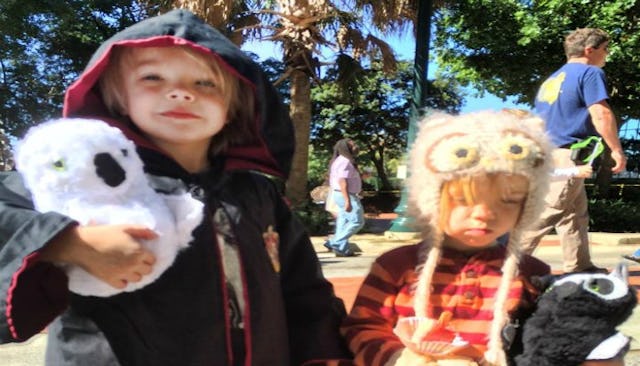'Harry Potter' Is A Family Affair, So We Let Our 7-Year-Old Listen To All The Books Too

“Expelliarmus!” my 7-year-old shouts.
“Expelliarmus!” his little brother yells back. They level wands at each other and lob imaginary curses. Well, the 5-year-old’s are imaginary. The 7-year-old’s are not. Blaise has listened to all seven of the Harry Potter books and seen all eight of the movies. The boy knows his jinxes.
Most 7-year-olds, if they’ve interacted with the Harry Potter franchise at all, have read the first book, maybe the second. After that, people argue, the books get too dark and too complicated. Time-turners, wizard prison, creatures that exist to suck the soul out of human beings — and that’s only book three, Prisoner of Azkaban. The books get darker from there, with the first real character death happening in book four, and wizards keep dropping dead from there on out. There’s true evil. There’s the death of near and dear ones. There’s even some making-out. Not the sort of thing you generally read your 7-year-old as a bedtime story.
Related: Accio Fandom! The 30+ ‘Harry Potter’ Spells Every Hogwarts Fan Should Know
We didn’t care. Harry Potter was important enough to us as a family that we wanted to share the magic of it with our kids as soon as possible, even if that magic came along with lots of wizard blood spilled. We read the first book aloud, and Blaise loved it: Wizards! Wands! Three-headed dogs and a magical castle! The fantastic elements were great fodder for the imagination. We bought him a wizard robe — Gryffindor, of course — and a stuffed snowy owl. He went as Harry Potter for Halloween, complete with eyeliner-drawn scar. And a wand, of course, his favorite part, which he took great delight in waving around and shouting spells.
Harry Potter first fired his imagination. And it continues to, all the way through book seven which **spoiler alert ** involves breaking out of the wizard bank riding a dragon, then killing Lord Voldemort. He talks about it all the time; he faithfully wears the Gryffindor hat and scarf his father picked out for him for Christmas. He’s invented his own spells, including “foglio,” which casts a fog around someone’s head and makes it impossible to aim a jinx at you. When he goes to some friends’ houses, they play Harry Potter — even when the only Death Eaters they can find are pirate-playing younger brothers.
But Harry Potter has done so much more than fuel his imaginative play. Because we listened to it in the car, together, it gave us some chances to have some pretty heavy conversations. We talked a lot about friendship, about Harry and Hermione and Ron and how sometimes they have each other’s backs (good!), and other times they snark and snit at each other (bad!). We talk about what Ron should have done, when, say, Harry’s name comes out of the Goblet of Fire or how the boys should have treated Hermione.
It’s also given us a space to talk about authority figures not always being perfect or right. Dumbledore raises Harry to be a man, knowing one day he’ll have to die to fulfill the cause. We talked about whether or not that was a good decision and how that made Harry feel. He had trouble seeing past the “of course, it’s all right in the end, because Voldemort dies” part, but at least we planted the seeds. The character of Dolores Umbridge gave us plenty of fodder for discussing that someone might have power, but that power doesn’t automatically make them right.
In a way, you could argue that Harry Potter is a struggle against authoritarianism of all kinds: the pureblood, Muggle-hating oppression of Lord Voldemort; the ineptitude of Cornelius Fudge; the saccharine iron fist of Dolores Umbridge. The lessons are varied and countless, depending upon your interpretation of the text and how deep you want to go.
And so we watch the movies. We read the books. We play with pretend wands. I even wave one and shout “Evanesco!” when I want them to clean their rooms. We joke about who’s in what house (my middle son insists he’s a Slytherin), and play with the Legos, which they use to arrange intricate scenes based on the books. They made a Lego Hogwarts the other day, out of random bricks, complete with a potions lab and an astronomy tower.
Most of all, Harry Potter creates a family touchstone for us. It’s something we can talk about and do, and something we can share together. So what if we lost some beloved characters along the way. In the end, Harry was victorious. Good beat evil. And I can’t think of any lesson I want to pass along more than that one.
This article was originally published on